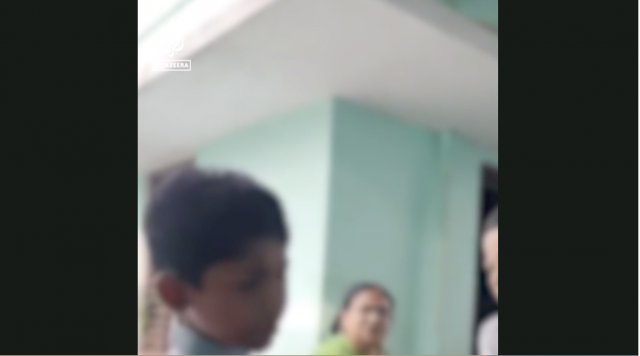Indian teacher inviting students to slap Muslim kid sparks outrage
Uttar Pradesh schoolteacher calls for student's eviction due to his religion, reveals viral video

A viral video on social media caught the attention of international news outlets on Saturday highlighting acute discrimination faced by religious minorities in India.
A school teacher in Uttar Pradesh, India's most populous state, could be seen in the video subjecting a seven-year-old Muslim student to degrading treatment.
The video, which surfaced on Friday, showed Trapta Tyagi, a primary school teacher asking for a Muslim student to be evicted due to his religion and asking his classmates to slap him.
A male voice could be heard in the background agreeing with the teacher.
“I have declared that all Muslim children should go,” Tyagi is heard saying in the video.
“You are correct, it ruins the education,” the male is heard saying as the victim stands in front of the class, wailing and terrified.
India may have made it to the moon but millions of Muslims still don't have basic rights as Muslims are lynched in public sight.
— muslim daily (@muslimdaily_) August 25, 2023
In this school the teacher asks Hindu children to slap a Muslim child, even berating them if they don't slap hard enoughpic.twitter.com/ci0YVgDpl2
Muslims constitute approximately a fifth of the 235 million population of Uttar Pradesh.
The parents of the seven-year-old, Mohammad Altamash, told Al Jazeera that the incident took place on Thursday in Neha Public School in Kubbapur village, 30km (19 miles) from Muzaffarnagar town.
“Yesterday, my son came home crying,” Rubina, his mother, said. “He was traumatised. This is not how you treat kids.”
According to his father Mohammad Irshad, the teacher “asked them [classmates] to slap my son one by one”.
Read India under fire after Islamophobic remarks of BJP officials
“The teacher justified her actions by saying my son did not memorise his lessons.
“My son is good at his studies. He takes tuition. We fail to understand why the teacher treated him like this. It seems that the teacher is filled with hate,” the 42-year-old added.
Police in India have asked social media users not to share the video, prompting various users to remove it from their accounts.
Irshad, a farmer, said that the ill-treatment of his son was the result of “hate that is being spread against Muslims in the country”, illustrated by the teacher’s comments heard in the video.
Rubina added that the teacher reportedly had a habit of getting students slapped by their classmates. She added that just a few days ago, another student from their family was subjected to similar treatment after he failed to memorise his lessons.
Deleted the video because @NCPCR_ wanted people to the delete the video. https://t.co/hZh7gajJQI pic.twitter.com/kt2yMt8GGC
— Mohammed Zubair (@zoo_bear) August 25, 2023
A police officer said a case will be filed after recording the statement of the child and the parents.
The school in question has students from the Hindu and Muslim communities in the area.
Irshad said that, although the teacher accepted her mistake and apologised for her behaviour, he will move his son to a different school.
“She said she will never treat her students badly again,” he said. “But this is not the environment where I want my son to get an education and grow up in.”
Yar this video is sooo heart breaking!! A school teacher in India orders Hindu kids to step up and slap a Muslim kid one by one.
— Fatima Tassadiq (@fatimatassadiq) August 25, 2023
You can land on all the moons in the solar system & it doesn't mean anything if teachers are training lynch mobs in schools. https://t.co/wlA93mhUN4
As the video went viral, it sparked outrage on social media, with many pointing out the growing Islamophobia in schools.
“A generation is growing up in a society that has normalised hostility and hate,” Nazia Erum, author of, Mothering a Muslim, told Al Jazeera.
She blamed the media and the state of politics for the growing hate in the country which she said “aims to only keep the minority Muslim population in negative light constantly”.


















COMMENTS
Comments are moderated and generally will be posted if they are on-topic and not abusive.
For more information, please see our Comments FAQ